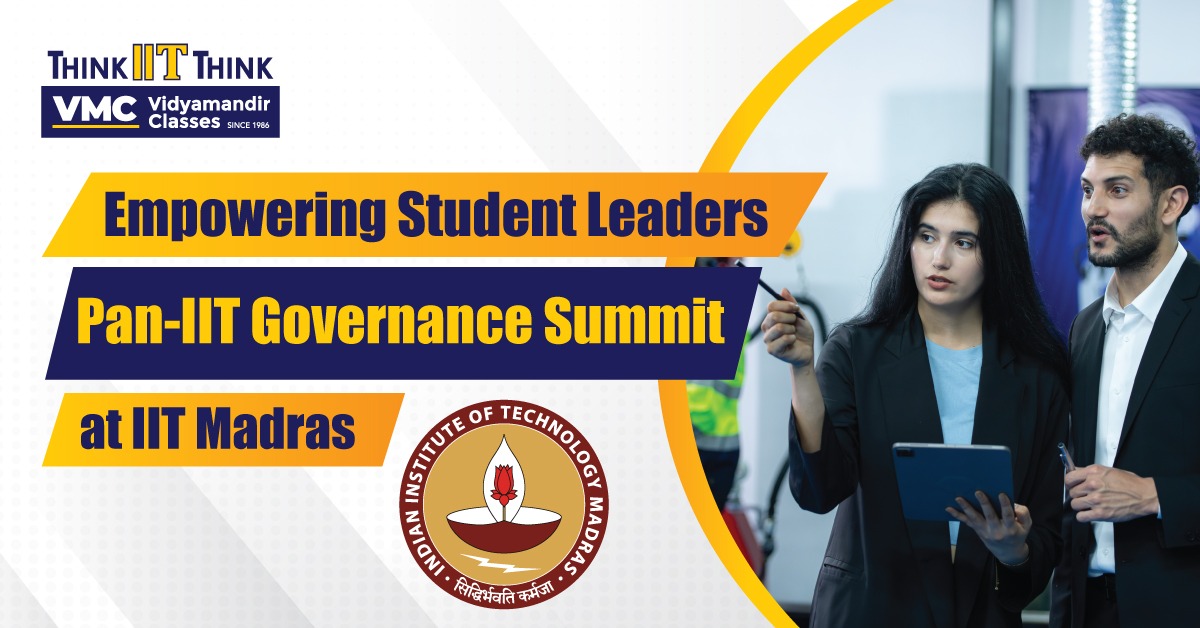Empowering Student Leadership: Inside the First Pan-IIT Student Governance Summit at IIT Madras
 Posted On
Posted On
88 total views, 2 views today
In a landmark event, the Indian Institute of Technology Madras (IIT Madras) hosted the first-ever Pan-IIT Student Governance Summit on October 26 and 27. This pioneering summit brought together student leaders from various IITs across the country to discuss, develop, and strategize initiatives for improving the student experience and governance within the IIT community. Over the course of two days, participants engaged in lectures, discussions, and collaborative sessions, exploring critical issues and creating actionable strategies for progress.
This blog takes a deep dive into the summit’s purpose, key themes, insights from speakers, and the vision for a collaborative IIT governance framework that emerged.
1. Setting the Stage: A New Era for IIT Governance
The Pan-IIT Student Governance Summit represents a significant step forward in fostering collaboration and community within the IITs. This event was specifically designed to provide student leaders with a platform to share ideas, exchange experiences, and shape policies that would not only benefit individual institutions but also contribute to a more cohesive and supportive IIT ecosystem. The gathering enabled representatives to address common challenges, brainstorm solutions, and establish durable networks across campuses.
Atharv Joshi, the Student Convenor for the summit and Speaker of the Student Legislative Council at IIT Madras, highlighted the transformative potential of the event. “This summit was a unique platform designed to foster collaboration, exchange ideas, and shape the future of student governance across our institutions,” he said, emphasizing the commitment to meaningful change and inter-IIT solidarity.
2. Thematic Focus: Key Issues Discussed at the Summit
The summit covered a wide range of themes, each reflecting a significant aspect of student life and governance at IITs. Expert-led sessions on topics such as sustainable campus policies, mental health, academic standards, research infrastructure, and cultural festivals provided students with the knowledge and tools to make informed decisions and advocate effectively.
a. Sustainable Campus Policies and Practices
Environmental sustainability has become a pressing issue in higher education, and this summit dedicated time to discussing “Sustainable Campus Policies and Student Practices.” Students learned about ways to implement green practices within their institutions, including waste management strategies, energy conservation initiatives, and ways to promote a culture of sustainability on campus.
b. Academic Standards and Research Ecosystem
Sessions on “Academic Standards and Policies” and “Research Affairs and Ecosystem Policies” delved into maintaining high academic and research standards within IITs. Topics covered included academic freedom, fostering innovative research, and balancing academic demands with student well-being. This focus on research not only encouraged students to pursue excellence but also emphasized the importance of creating a supportive and resourceful research environment.
c. Student Mental Health and Well-being
One of the most anticipated sessions focused on “Student Mental Health and Holistic Wellbeing.” Recognizing the intense academic pressures students face, the summit addressed the need for mental health support systems. Speakers and participants shared insights into promoting mental health awareness, establishing peer support networks, and collaborating with mental health professionals to ensure that students have access to comprehensive care.
d. Placements, Internships, and Career Development
Another vital topic was the management of placements and internships. The session on “UG Placement and Internship Management Policies” examined ways to streamline placement processes, connect students with high-quality internships, and build career development support systems. Discussions included encouraging partnerships with industry leaders, leveraging alumni networks, and exploring cross-campus placement strategies to enhance opportunities.
e. Cultural and Tech Fest Strategies
Cultural and technical fests are essential elements of IIT student life, serving as platforms for creativity, networking, and skill-building. The summit explored strategies to organize and sustain these events in a way that promotes inclusivity and enhances the visibility of student talent. Participants deliberated on resource allocation, sponsorship acquisition, and the use of tech-enabled solutions to boost engagement.
3. Transforming Student Leadership: Skills and Competencies for Change
The summit placed a strong emphasis on empowering student leaders to take action within their respective IITs. By developing skills in policy formulation, effective communication, and collaborative problem-solving, the summit aimed to shape a new generation of leaders who can drive change.
Participants learned about strategic planning and were equipped with the skills needed to turn ideas into actionable initiatives. They received training on advocacy and leadership best practices, helping them communicate effectively with administrators, faculty, and fellow students. This focus on competency development underscored the summit’s vision to create leaders who can inspire and mobilize the student body to work towards meaningful improvements.
4. Building a Collaborative IIT Network
Beyond the lectures and workshops, the summit served as a crucial networking opportunity for students across IITs. It fostered an environment of collaboration, where representatives could share ideas, gain insights from one another’s experiences, and establish long-lasting connections. These relationships are expected to sustain inter-IIT communication, coordination, and support well after the summit’s conclusion.
For many attendees, the connections they formed at the event are perhaps one of the most valuable takeaways. These bonds will enable ongoing collaborations across campuses, creating a shared IIT community that extends beyond institutional boundaries.
5. Vision for the Future: Implementing Change at IITs
As the summit drew to a close, students returned to their respective campuses with a renewed sense of purpose and a collection of actionable strategies. The next steps for these student leaders involve working with administrators, faculty, and their peers to bring their ideas to life. Initiatives such as sustainable practices, improved mental health resources, and efficient placement management are just a few examples of the changes students aim to implement.
One notable aspect of this summit was the emphasis on accountability. Participants outlined specific plans to monitor and measure the impact of their initiatives, ensuring that progress can be assessed and adjustments made as needed. By fostering a culture of responsibility, the summit encouraged students to be accountable for their projects and uphold the values of integrity and transparency in their leadership roles.
6. Enduring Impact and Long-term Goals
The Pan-IIT Student Governance Summit represents an essential milestone in the evolution of student governance at IITs. By providing a forum for idea exchange, collaboration, and leadership development, IIT Madras has set a powerful example of how institutions can actively involve students in shaping their own educational environment.
Looking forward, this summit has the potential to become an annual tradition, allowing new leaders to build on the progress made by their predecessors. The long-term goal is to create a consistent and interconnected IIT governance framework that is resilient and responsive to the needs of students across all campuses. Through sustained communication, collaborative problem-solving, and a commitment to excellence, the Pan-IIT Student Governance Summit has laid the groundwork for a brighter, more inclusive future for IIT students.
Conclusion: Uniting Student Voices for a Brighter Future
The inaugural Pan-IIT Student Governance Summit was more than a two-day event; it was the beginning of a movement. It highlighted the potential for IITs to work as a unified community, addressing shared challenges, leveraging each other’s strengths, and creating an environment where students can thrive both academically and personally. By empowering students with knowledge, resources, and networks, the summit has paved the way for stronger student leadership and governance across IITs.
Through continued efforts, it is hoped that future summits will build on this foundation, tackling emerging issues and refining solutions that can be adapted across campuses. The students, leaders, and visionaries who gathered at IIT Madras have taken the first step toward a future where student governance is not only about representing their peers but also about transforming the educational experience for generations to come.



